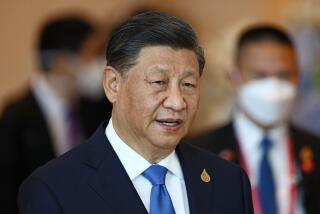Government Forces Soon, U.S. Aide Says
- Share via
WASHINGTON — The Reagan Administration’s top Asia specialist declared Tuesday that the Communist insurgency in the Philippines is growing steadily and the rebels could match the government in military strength in three to five years.
Assistant Secretary of State Paul D. Wolfowitz said at a breakfast meeting with reporters that President Ferdinand E. Marcos’ government has failed so far to take the political, military and economic steps necessary to defeat the Communists, who seem to have seized the battlefield initiative.
Administration officials were even more blunt in private, complaining that Marcos and the political-military clique that enjoys his patronage are far more concerned with maintaining their privileged economic status and with positioning themselves to win the next election than they are with defeating the Communist New People’s Army.
The deteriorating situation has put President Reagan in the same sort of situation faced by President Jimmy Carter in trying to deal with the repressive but crumbling regimes of Anastasio Somoza in Nicaragua and Shah Mohammed Reza Pahlavi in Iran. U.S. calls for reform in Nicaragua and Iran were resisted by the governments there, and eventually they were overthrown by regimes that Washington came to consider far worse.
The stakes are said to be even higher in the Philippines because of the presence of two of the most important U.S. military facilities outside the United States--Subic Bay Naval Base and Clark Air Base. Marcos has suggested that he might revoke the lease for the bases if Washington attempts to meddle in Philippine politics.
Although Wolfowitz said no other location would serve U.S. strategic interests as well, he insisted that “we’re not going to have our policy held hostage by the bases. Our first and foremost objective will be to maintain a healthy non-Communist Philippines. If the Communists get in, the bases will go, and a lot more as well.”
State Department spokesman Charles Redman said the United States has no intention of voluntarily abandoning the bases. However, he said it was “axiomatic” that the United States would have contingency plans in case the bases had to be evacuated.
Adm. James D. Watkins, chief of naval operations, said in a speech in Richmond, Va., Tuesday that the Pentagon is “seriously looking at alternatives” to the Philippine bases, but he added: “We’re not anxious to do anything but to maintain the status quo.”
Wolfowitz said the Administration hopes to salvage the situation by encouraging Marcos to hold fair elections, reform the economy and restore professionalism to the military. He appeared to rule out more radical steps when he said, “We’re not going to make the situation better by saying, ‘Anything is better than Marcos.’ ”
Marcos, who has held office for 20 years, is believed to be in delicate health, both physically and politically. Nevertheless, Wolfowitz said he remains “a very strong leader with the ability to do a lot of things if he wants to do them.”
Reagan has sent one of his closest friends, Sen. Paul Laxalt (R-Nev.), to Manila to try to persuade Marcos to take the steps that Washington considers necessary. Wolfowitz said Laxalt’s personal relationship with Reagan may add weight to the message because, “if there is a tendency (by Marcos) to dismiss some people as bureaucrats, he (Laxalt) is not that.”
Marcos and his military leaders tend to discount the danger from the New People’s Army. The Philippine government estimates the Communists’ armed strength at 12,000, facing more than 150,000 members of the armed forces.
However, Wolfowitz said the rebels may have as many as 15,000 regular members backed by “a lot more sympathizers--those numbers are impossible to estimate.” In addition, he said the Communists have been growing at a “disturbing pace.”
“If present trends continue, within three to five years, you could have what in the Communist lingo is ‘strategic stalemate,’ where their military strength is essentially equal to the government,” he said.
The insurgency appears to have developed domestically, he said. The New People’s Army once had close ties to China, but that relationship has eroded in recent years.
More to Read
Sign up for Essential California
The most important California stories and recommendations in your inbox every morning.
You may occasionally receive promotional content from the Los Angeles Times.












